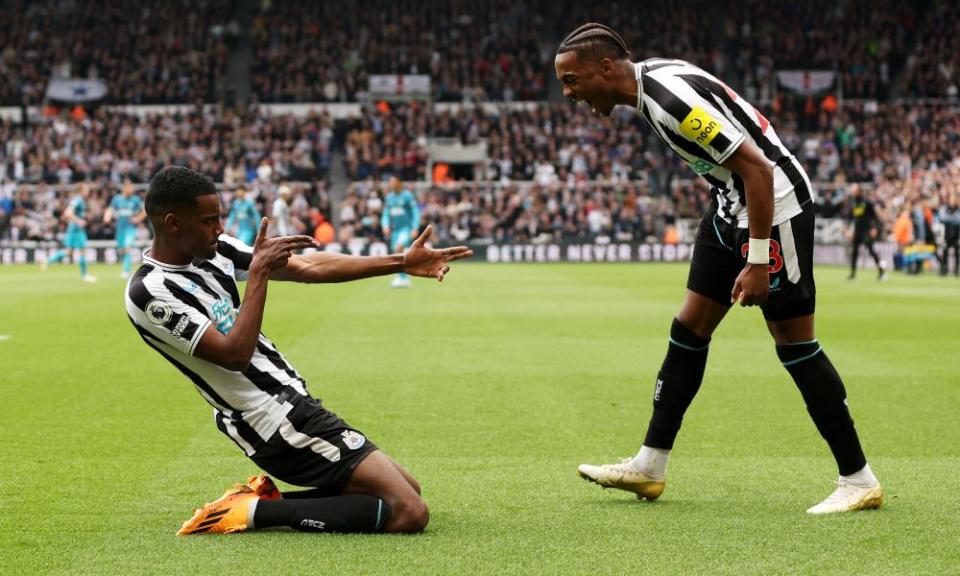Premier League 2022-23 review: signings of the season

Erling Haaland (Manchester City)
The simplest deals are often the best deals, and too many overthought this one. What would a manager like Pep Guardiola do with a guaranteed goal machine with the cruising speed of a runaway Scania and the height of an Olympian pole vaulter? The answer, once the requisite adjustments had been made, was that Guardiola and Manchester City now had the use of a goalscoring force so powerful that early 20th-century ghosts such as Dixie Dean and George Camsell were brought back to prominence. All while journalists reached for metaphors along the lines of “wrecking ball” and “Death Star”; Haaland appears to have made City more powerful than they could possibly imagine. Pity poor Darwin Núñez, who entered the season being compared to the Norwegian, and at Liverpool had the kind of inconsistent season that might be expected of a new signing in a new country. From two goals on his league debut at West Ham onwards, there could never be doubts in Haaland.
Download the Guardian app from the iOS App Store on iPhone or the Google Play store on Android by searching for 'The Guardian'.
If you already have the Guardian app, make sure you’re on the most recent version.
In the Guardian app, tap the Menu button at the bottom right, then go to Settings (the gear icon), then Notifications.
Turn on sport notifications.
Casemiro (Manchester United)
The Brazilian faded a little as the season went on, the bite in his tackling losing ferocity once he started collecting suspensions and red cards. A second sending-off against Southampton in March extended his absence after a challenge that might have endangered Saints’ Carlos Alcaraz, after which Casemiro was tearful and genuinely contrite. Whatever happens for the rest of the five-year contract he signed last summer, he has already had a transformative effect on Manchester United. Should the club’s upward curve continue, then he might one day be remembered as the veteran signing who reset his new club, like Edgar Davids joining Barcelona in 2004 or Gary McAllister at Liverpool in 2000. Erik ten Hag himself took a while to hand Casemiro a leadership role but was rewarded with a player whose creativity – he is an expert passer – belied his previous reputation as Real Madrid’s destroyer.
Gabriel Jesus (Arsenal)
Talking of transformative signings, Mikel Arteta going back to his former employers at Manchester City to wrest two players he had enjoyed working with helped set the mood for Arsenal’s excellent campaign. Oleksandr Zinchenko, cutting in from left-back to be a playmaker, was a highly worthy addition, a leader within the team, and set a template Liverpool have since followed with Trent Alexander-Arnold. It was, Jesus, though, whose arrival altered Arsenal’s outlook. Defending from the front like a yard dog, in perpetual motion, bringing Gabriel Martinelli and Bukayo Saka into play, the Brazilian inspired Arsenal to their long-time leadership of the Premier League. A leading “what if?” of the season must be what might have happened if Jesus had not injured his knee in a World Cup group game against Cameroon that Brazil could afford to (and in fact, did) lose. Jesus returned in March, by which time the gap had narrowed and the energy levels of those around him had critically dropped.
João Palhinha (Fulham)
Fulham arrived back in the Premier League expected to be the same flaky fancy-dans who had been relegated on both their previous attempts at top-flight survival. Marco Silva put paid to that with the adept signing of a player who had been a late developer in Portugal but was integral in Sporting’s surprise 2020-21 title win. Upright and lean, visibly rugged, Palhinha is akin to what used to be known as a “hatchet man”, in that few get past him in midfield without a mark being left; the tactical foul is a speciality as a division-leading 14 bookings reveals. Palhinha is also a high-class distributor of the ball in the classic Portuguese style. He and Harrison Reed quickly formed an energetic, fierce midfield partnership that has made Fulham far more difficult to beat than anyone expected – aside from Silva, perhaps.
Alexander Isak (Newcastle)
Having splashed out £100m in January last year, Newcastle were restricted by financial regulations from shooting for the executive class of international megastars last summer. Instead, Sven Botman, Nick Pope and Isak came in. Each of them has delivered but Isak, the slowest-burning success, looks to have the highest potential ceiling. The goals have not flowed in the manner of his fellow Scandinavian striker Haaland but, whether rotating with the excellent Callum Wilson as striker or cutting in from the left, Isak has become a leading man for a team that have become one of the most potent around. In his solo run against Everton on 27 April, slaloming along the byline past flagging blue shirts to set up Jacob Murphy for the final goal in a 4-1 win, Isak also supplied the season’s prime moment of skill and improvisation. There is so much more to come, too.
Ben Mee (Brentford)
The one-time Guardian contributor and a special guest on Monday Night Football this season has lived a few lives in football, from struggling to make the grade at Manchester City to making his way upwards with Burnley, where his plain-speaking activism against racism won him wide admiration. He ended last season as a player-coach as Burnley were relegated but, at 32, still had much more to give as a full-time player available on a free transfer. His experience made him ideal for Thomas Frank’s Brentford, looking to add defensive quality after a fine first season in the Premier League. Mee’s durability, bravery and positional play helped tighten up Frank’s team and, though the Dane likes his team to press hard, there have been more chances to glimpse Mee’s poise on the ball than was previously possible at Sean Dyche-led Burnley.

 Yahoo Sport
Yahoo Sport 





































